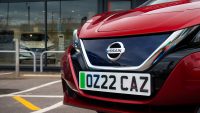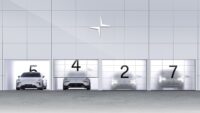EV drivers will have to pay 3p per mile they drive under a new tax introduced by the chancellor.
In her Autumn Budget today, chancellor Rachel Reeves finally revealed how much the pay-by-mile tax will be, bring an end to weeks of speculation about the tax that’s been branded a ‘poll tax on EVs’.
From April 2028, drivers of electric vehicles and plug-in hybrids will have to fork out for the privilege of driving a car with a plug. The 3p-rate will rise annually with inflation, according to the Office of Budget Responsibility, while drivers of plug-in hybrids will pay 1.5p per mile.
The move is expected to raise £1.4bn, as part of a tax raise of £26bn in 2029-30.
At 3p per mile, it’s 6p cheaper than the mooted pay-per-mile rate for EVs.
The chancellor also raised the Expensive Car Supplement (ECS) for EVs to £50,000. It means cars priced below this won’t have to pay Vehicle Excise Duty (VED) ECS.
She also reiterated the news that luxury vehicles would be removed from the Motability system, and the extension of the Electric Car Grant.
Meanwhile, fuel duty has been extended to September 2026. The tax has been held at 57.95p since 2011, but the effective rate paid by drivers since 2022 has been 52.95p as a result of a ‘temporary’ 5p cut.
The BBC reported the freezing of fuel duty will be followed by staged increases from 2026, costing £2.4bn in 2026, and £900m each year afterwards.
There won’t be cuts to the price of public charging, however, despite industry calls.
What the industry says
‘We recognise that fuel-duty revenue is declining as drivers switch to electric vehicles. The AA is uniquely placed to assist government in designing a fair and transparent system. The challenge is clear: it must be simple, trusted, and equitable for all road users.
‘Getting the timing right is crucial, and there will be concerns that should pay-per-mile for EVs be introduced too soon it may put slow down the switch to electric cars.
‘Drivers will naturally have questions about such a scheme, which is why The AA will lead the charge for a fair and transparent system which is easy to understand. We will also need protections for certain groups, like carers who use their car for work and rural drivers who are more car dependent.’
Edmund King, AA president
‘The mixed messaging we’re getting from the government around EVs doesn’t speed up the switch – it stalls it. A transition of this scale needs a steady hand and consistent policy, not one foot on the brake and the other on the accelerator. That kind of confused approach risks slowing the journey before we’ve even got started, and will make manufacturers’ 80% EV sales target by 2030 even harder to deliver for dealers.’
Ginny Buckley, Electrifying.com
‘The government will be aware that taxing all plug-in vehicles per mile from 2028 could slow down the transition to electric vehicles. This is no doubt why it has expanded the Electric Car Grant.
‘We note the government hasn’t cut VAT on public charging from 20% to 5% to match the rate levied on domestic electricity. This means drivers who can’t charge at home will continue to pay more.’
Simon Williams, RAC head of policy
‘On electric vehicles, the chancellor is driving with the handbrake on. The Office for Budget Responsibility estimates that there will be 440,000 fewer electric cars on the road thanks to the introduction of pay-per-mile charging from 2028. This sends completely the wrong signal as only 130,000 of these sales are offset by moves to make EVs more affordable, such as raising the Expensive Car Supplement from £40,000 to £50,000.
‘In the OBR’s own words, this new charge is likely to reduce demand for electric cars as it increases their lifetime cost. Does she want people to buy electric cars or not?’
Ian Plummer, Auto Trader
‘A pay-by-mile scheme for electric vehicles risks increasing costs for many drivers, particularly those who rely on their cars for higher annual mileage.
‘With energy bills rising and public charging becoming more expensive, motorists will fear that EV ownership could end up being significantly more expensive than traditional ownership.’
John Cassidy, sales managing director, Close Brothers Motor Finance
This story is being updated



































